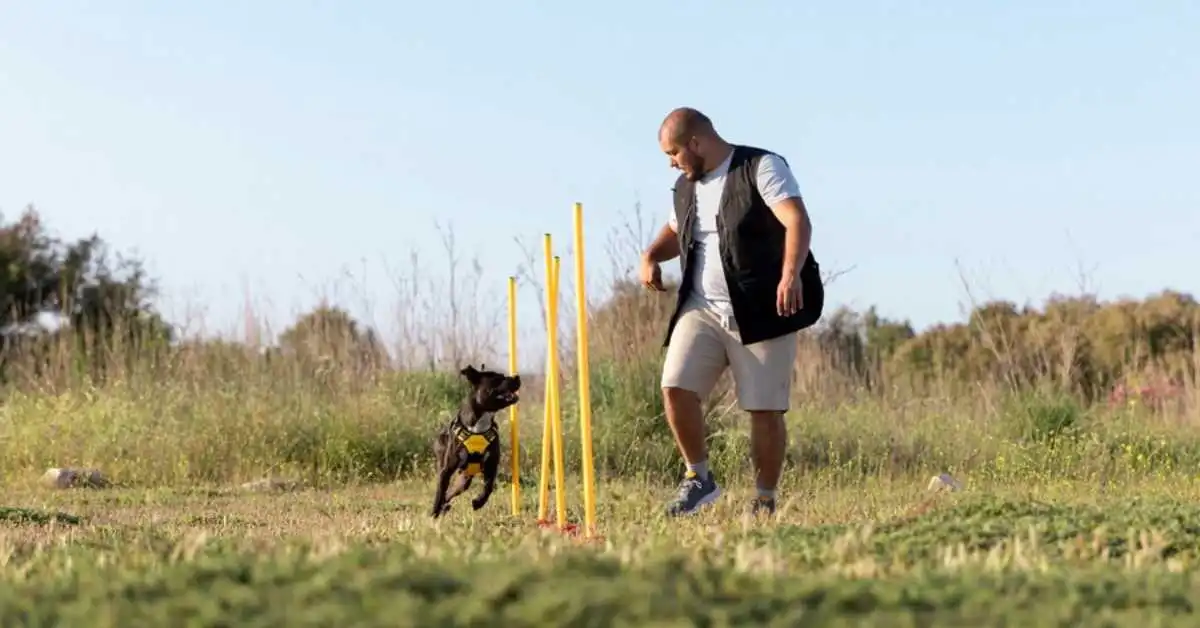German Shepherd Playfulness: talks about how playful German Shepherds are. These dogs have lots of energy and love to play. It’s essential for their health and happiness. Playing games like fetch can make them brighter and help them get along better with their owners.
This guide gives tips on how to play with them the right way. It says you should play with them often, use different toys, and make sure they get enough exercise. This helps them stay happy and healthy and strengthens your friendship with them.
German Shepherds: An Overview
Imagine a dog that’s super smart, strong, and loyal. That’s a German Shepherd.
Initially, these dogs were bred to help farmers herd sheep in Germany. They’re like the ultimate helpers, with fur like a soft blanket and pointy ears that perk up when they hear something interesting.
But German Shepherds are more than just farm dogs.
Because they’re so intelligent and trainable, they can do all sorts of excellent jobs. They can help the police catch bad guys, sniff out danger like bombs, or even be a guide for someone who can’t see. They’re like superheroes in the dog world.
Don’t let all that work fool you, though.
German Shepherds are only some business. They love to have fun, too! They love to play fetch, go for walks, and cuddle up with their families. It’s like having a furry best friend who can also help around the house (well, maybe not with the chores).
This mix of hard work and playful fun makes German Shepherds unique.
They’re loyal companions, fantastic workers, and all-around amazing dogs.
Physical characteristics of German Shepherds.
German Shepherds are big, strong dogs! Think tall and muscular, with males being a bit bigger than females. They look super cool with sleek fur that comes in two layers, like a furry winter coat. This fur does fall out sometimes, so brushing helps keep it healthy.
Their faces are neat, with pointy ears and warm brown eyes showing their smartness and curiosity. They’re always up for learning new things.
German Shepherd Play Style.

A German Shepherd lives next door; seeing how it plays is fun. This dog went to a particular place called Unleashed Joy, where dogs can play and stay without being in crates. Even though there are lots of young and energetic dogs there, the German Shepherd likes to do its own thing, enjoying walks, meals, and playtime.
This dog is happy at home and fits in well, doing what’s expected during playtime. When it plays outside, it sometimes acts like the group leader, especially if things get too wild. It’s like the dog is a police officer stepping in to calm things down. Watching this German Shepherd play, whether chasing around with other dogs or hanging out, is fascinating.
German Shepherd Chasing Play Style
In the picture was a big, 110-pound German Shepherd and a more petite, 90-pound one playing. They looked scary to people who didn’t know how gentle they could be. These dogs love to chase. Inside the house, they would start a game by grabbing a favorite toy or bone and running away, hoping the other would chase them. They also liked to run and dance around each other. Seeing them play was terrific because they were so big and energetic.
When they were outside, the older dog would play with a tennis ball all day. It was impressive how the younger dog tried to keep up with its older brother, running and taking short breaks before starting to play again.
German Shepherd: Tug and Wrestling.
The dogs wrestled and played by jumping on each other and pretending to body slam, which is how they like to play. They also played a game called “bitey face,” where they gently bit each other’s faces. This might look scary, but it’s just their way of playing. Even if dogs are very different in size, they can still play together nicely. These two dogs, almost the same size, live together all the time, so there’s no need to worry about them.
They played a fun game called tug, where each dog grabbed the end of a toy and pulled. It’s an excellent game for them because they both are strong and love to see who can win. This might not seem very comforting, but for them, it’s just a good time to play together.
The German Shepherd growled.
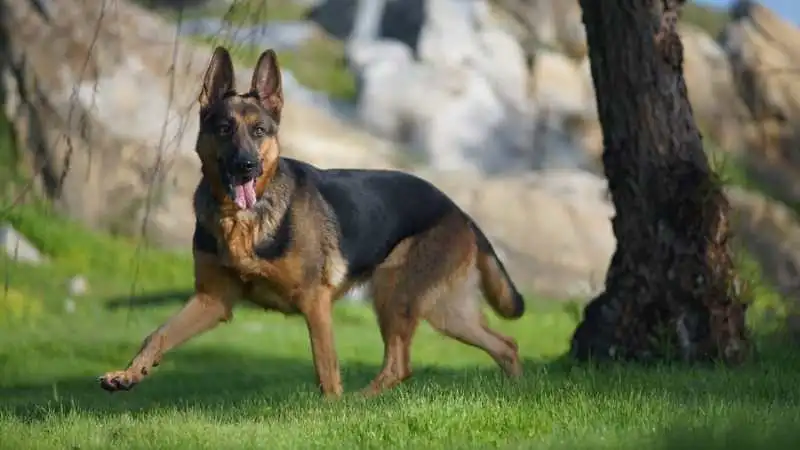
“Bitey Face” is a game that German Shepherds like to play, where they pretend to bite each other’s faces and might growl. These growls sound scary, but they are standard when dogs play. It’s just how they have fun, and it doesn’t mean they are being mean or aggressive.
When the older dogs at home greet someone at the door, they might bark loudly, but once they know who’s coming in, they calm down. German Shepherds are known for being vocal, so hearing them growl during play is expected. It’s important to understand that when a German Shepherd growls while playing, it’s usually just part of their fun and not something terrible.
German Shepherd Temperament and Personality Traits.
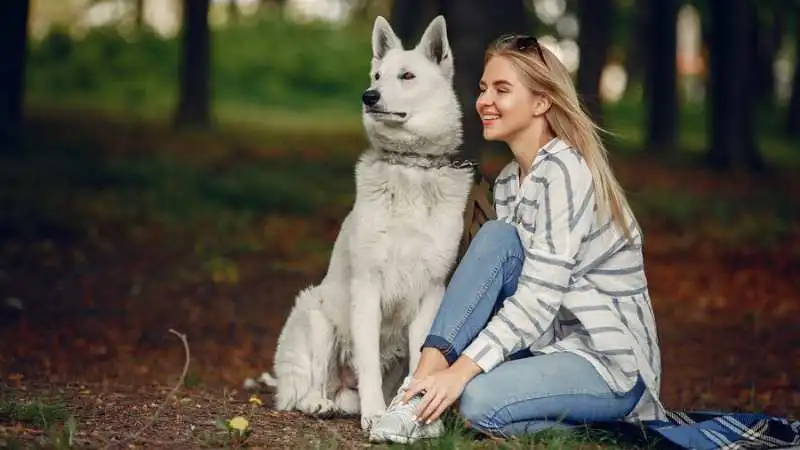
German Shepherds are naturally protective dogs and are usually great with families, kids, and other animals. They are known for their German Shepherd playfulness, intelligence, bravery, and confidence. This makes them popular pets because they are good at keeping their families safe and love to play and have fun.
Positive temperamental traits.
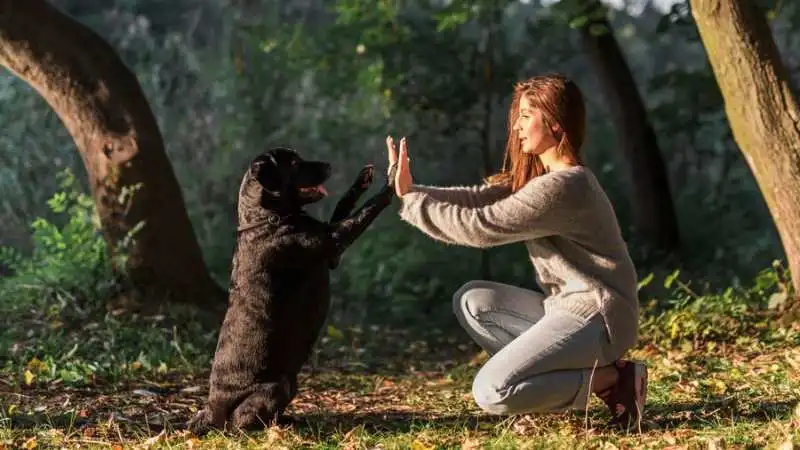
Intelligence:
German Shepherds are intelligent and learn quickly, making them good at training and various jobs.
Work Drive:
They are happiest when they have something to do, showing a strong desire to work, which comes from their breeding.
Loyalty:
These dogs are known for their loyalty to their families, forming strong bonds, and being very protective.
Courage:
As famous K9s, military, and search-and-rescue dogs, they are brave, often serving as reliable guard dogs.
Alertness:
German Shepherds have an excellent sense of alertness, making them popular watchdogs who notice environmental changes.
Confidence:
They are confident and calm and can easily handle new situations without getting rattled.
Obedience:
Due to their intelligence and desire to please their owners, they are very obedient.
Energetic:
These dogs have high energy levels and need lots of physical exercise and mental stimulation. They enjoy outdoor activities and dog sports.
Playfulness:
Despite their serious appearance, they have a playful side and love interactive play with family members, including adults and children.
Adaptability:
German Shepherds do well in various environments, from farms to bustling cities, as long as they are given enough mental and physical stimulation.
Easy Grooming:
Their coat is low-maintenance, but they shed, so regular brushing is needed to manage the shedding.
Negative Temperament Traits
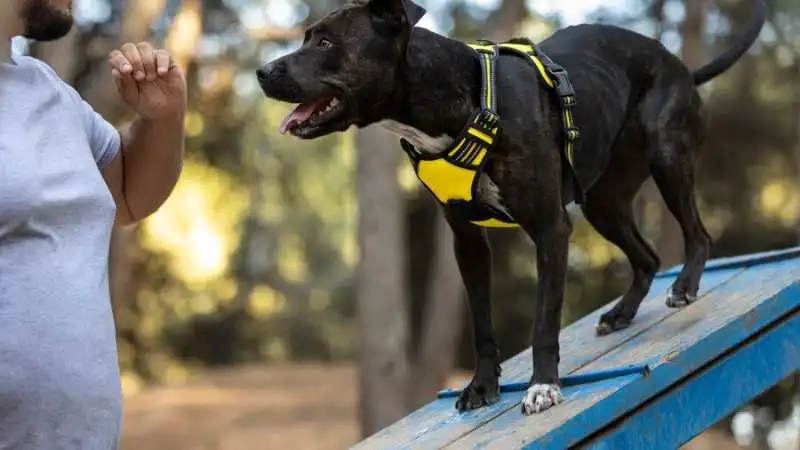
Aggressive, if not socialized:
If not properly socialized when young, a German Shepherd might become aggressive toward other pets and people because they are naturally protective of their family.
High prey drive:
They have a strong instinct to chase smaller animals, like squirrels, making daily walks in areas with small pets or livestock challenging.
High energy:
Working dogs have lots of energy and need something to do. They might start destroying furniture or stealing items without an outlet for their power.
Exercise needs:
These dogs need a lot of exercise, not just a walk around the block. Owners should be ready for daily vigorous activities or consider hiring a dog walker to prevent destructive behavior.
Shedding:
With their double coats, they shed a lot. Regular washing and brushing are needed, and investing in a quality vacuum can help manage hair shedding.
Behavioural help:
Working with a certified professional dog trainer can be beneficial if owners need help with their dog’s behaviors.
German Shepherds’ Temperament During Different Life Stages
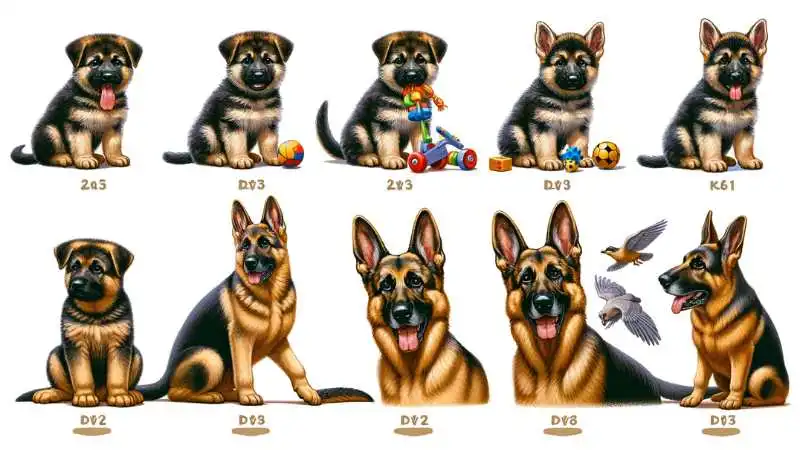
Puppyhood (birth to 1 year):
This is a super important time for learning and socializing. Like how you learn stuff in school, German Shepherd puppies must be exposed to new people, animals, and experiences. This helps them become well-adjusted adults.
Adolescence (1 to 2 years):
Prepare for teenage rebellion. German Shepherds might test your limits and have bursts of energy. This is when consistent training is crucial in reminding them who’s boss (in a kind way, of course!).
Adulthood (2 years onward):
Finally, some peace! With proper training and love, adult German Shepherds become loyal and well-behaved companions. They’re still full of energy but more focused and easier to handle.
Remember, every stage is essential for shaping a German Shepherd’s personality. With love, training, and good experiences, your furry friend will grow into a fantastic companion.
The Puppy Years and Early Temperament
Gentle Training:
Show them the ropes with positive reinforcement (treats and praise!) so they learn what’s expected of them.
Meeting new friends:
Introduce them to new people, animals, and sights while they are young. This helps them feel confident and prevents fearfulness later.
Love and Play:
They crave attention and playtime with their family. This builds a strong bond and brings out their playful side (German Shepherd playfulness).
You’ll raise a happy, well-adjusted German Shepherd companion by putting in the effort during puppyhood.
Mature Temperament and Adulthood
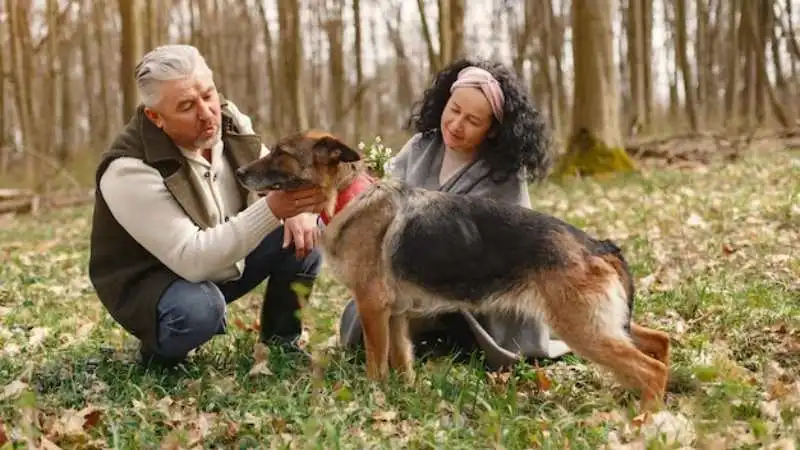
Teenager Time (6 months to 2 years):
Like human teens, they might sometimes have bursts of energy and test the rules. Keep training them to remind them of their good manners.
Adulthood (2 years onward):
They calm down a bit but still have lots of energy. Give them activities like agility training, hikes, or games to keep them happy! This exercise keeps them relaxed and chilled at home.
Senior Years and Changing Temperament
They need less exercise but still like to play some! Shorter walks and calmer games are perfect.
Their senses might not be as sharp, so they might be more cautious around new people or kids. Be gentle with them during their golden years.
Keeping German Shepherds Happy at Home
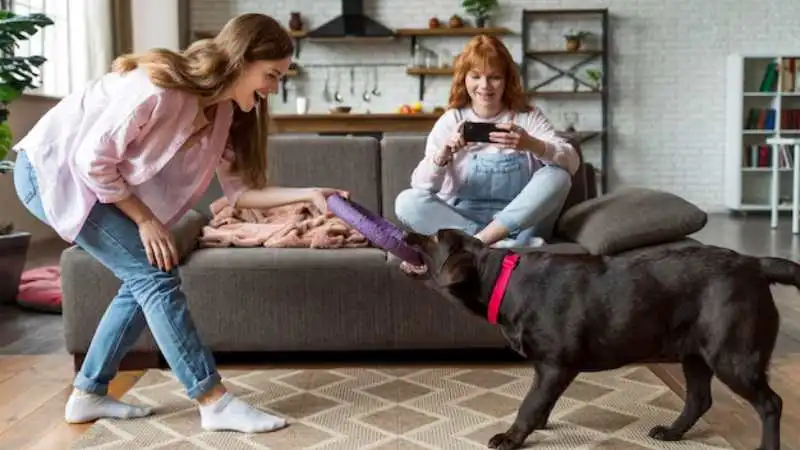
Energy Outlet:
These brainy pups have tons of energy! Daily exercise like walks, fetch games, or dog sports is necessary. Think long walks, not just a quick trip around the block.
Training Time:
Being clever means they learn quickly. Training helps them become good companions and avoid bad habits (like chewing your furniture!).
Mental Challenges:
Keep their minds sharp with games and tricks! This is like brain exercise for them and keeps them happy.
Space to Roam:
German Shepherds are curious and love exploring. Ensure they have enough space to run and sniff around safely in your house or yard.
Alone Time Training:
They don’t like being alone for too long. Train them to be okay when you’re gone so they don’t get bored and anxious.
Solid & safe gear:
Big dogs need strong leashes and collars to secure them during walks and adventures.
FAQs about German Shepherd Playfulness
Are German shepherds good family dogs?
Yes, German Shepherds can be good family dogs because they are loyal, protective, and intelligent. They get along well with children and can be trained to behave appropriately around the home. However, they require regular exercise, training, and socialization to be happy and well-adjusted family members.
Are German shepherds friendly or aggressive?
German Shepherds can be friendly and aggressive; it depends on their training and socialization. They are generally loyal and protective, making them friendly with their family and cautious around strangers. They can be well-behaved and friendly dogs with proper training and early socialization.
Are German shepherds good with kids?
Yes, German Shepherds can be good with kids if they are adequately trained and socialized from a young age. They are protective and can be gentle companions, making them suitable for families. However, supervision is essential to ensure safe interactions between the dog and children.
Are German Shepherds mischievous?
German Shepherds can be mischievous, especially when they are young or bored. They are intelligent and energetic dogs that need mental and physical stimulation to prevent mischievous behaviour. Proper training and regular exercise can help channel their energy positively.
Why do German Shepherds like to play so much?
German Shepherds like to play so much because they are highly energetic and intelligent, needing mental and physical stimulation. Playtime helps satisfy their instincts and work drive. Additionally, playing strengthens their bond with their human family and keeps them engaged and happy.
Bottom lines
German Shepherds are energetic, intelligent, and playful pups who can become loyal companions for active families. But remember, they have a lot of energy and need training, exercise, and mental stimulation to stay happy and well-behaved. With love, training, and suitable activities, a German Shepherd can be a furry best friend who will bring joy to your life for years to come.
